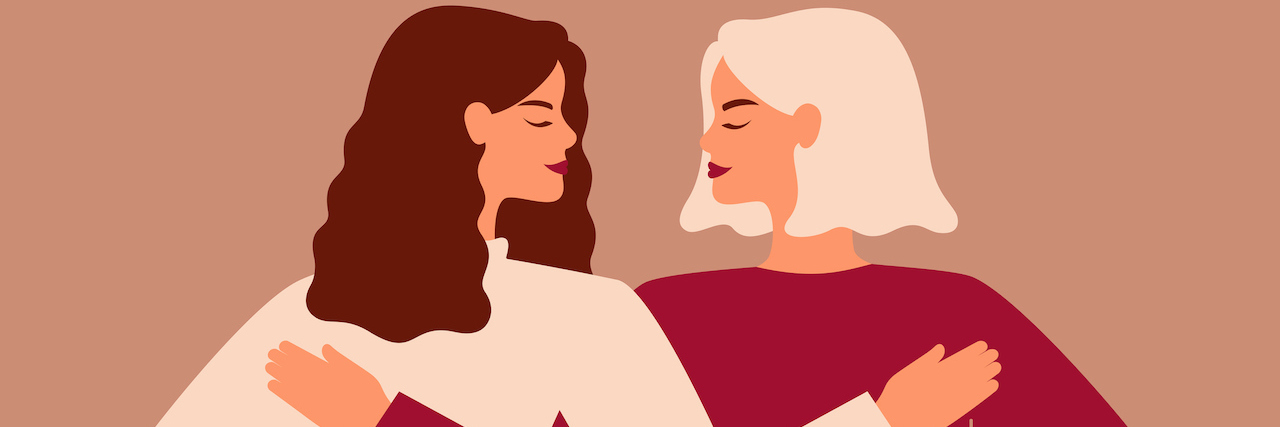By Laura Joseph and Sandy L.
While working at a medical nutrition practice, Laura (29) and Sandy (31) became close friends. After learning each had been diagnosed with a mental illness in their 20s, they joined forces, offering support, solidarity and acceptance to one another on their respective journeys to recovery and remission.
As they’ve continued to gain insight into their mental health and uncover new ways to overcome their struggles, Laura and Sandy have found that the widespread mental health community unites us more than our different disorders separate us. In their own words, they hope to remind everyone of that unity with a message of hope.
1. Who are you and what mental health disorder are you diagnosed with?
Sandy: My name is Sandy, I’m 31 years old, and I was diagnosed with bipolar disorder type II rapid cycling in November 2010.
Laura: My name is Laura. I am 29 years old and I was diagnosed with obsessive-compulsive disorder (OCD), and anxiety disorder in January 2016. Along with anxiety, I struggle with bouts of depression.
2. What was your experience being diagnosed?
S: After a months-long downward spiral, I was diagnosed with bipolar disorder when I was 21. Once the shock and denial wore off, I remember feeling terrified, ashamed, alone; and I felt that way for a long time. I was under the impression only “crazy people” were diagnosed with mental illnesses and I didn’t want to be seen that way. Worst of all, my first psychiatrist was insensitive and had really poor bedside manners that added to insecurities. When I realized I deserved better from my practitioner, I quickly found a more-qualified psychiatrist to treat me and my prognosis started to look up.
L: I had sat through years of failed talk therapy with providers, and while medication helped alleviate some of my anxiety and depression, it was clear something was still wrong. When I fell in love for the first time in my 20s my brain went into overdrive. I was agitated all the time, over-analyzing feelings and behaviors, replaying my past experiences to understand my present, racing thoughts keeping me up at night, and I had horrible mood swings. When I was diagnosed with OCD, I felt relief. For me, it was an answer—something tangible that explained what was going on inside my head and, more importantly, the first step towards recovery and health. I remember sitting on my therapist’s couch and my only question was: “OK, so what do we do now?”
3. How did your mental illness manifest?
S: I started showing symptoms of bipolar disorder when I was 13, but in the early 2000s when much was still misunderstood about it, my psychologist missed the signs of an impending, full-blown mental health breakdown. Body dysmorphia, eating disorders and bullying coincided with my uncontrollable outbursts of anger and depression, and my problems were chalked up to puberty. But by the time I turned 20, my mood swings erupted. I had strange lapses in time (similar to blackouts), went on bizarre shopping sprees, joined every community group and drastically changed my look depending on how I was feeling—all of which was completely out of character for me.
L: High school was marked by disordered eating, overexercising and social anxiety as I tried to fit in with my peers. This also began years of isolation, depression and loss of self. When I began to question my sexuality at 16, I experienced a loop of internal dialogue, panic attacks and suicidal thoughts. Back then, OCD was brought up once but wasn’t mentioned again until 10 years later when I fell in love for the first time and began obsessively questioning my relationship: what if she’s not the right person? Oh, he’s cute. Does that mean I should be with him and not her? Am I gay? Am I bi? How would I know? What would people think?
4. What was/is the hardest part of living with an anxiety disorder?
S: Anxiety is the most exhausting aspect of my bipolar journey and something I struggle with daily. The hardest part is the fear of the unfamiliar and feeling like I’m missing out. Ideally, I want to live a more creative and spontaneous life—to dance in public and not worry what others think of me, or converse with interesting strangers; to have enriching experiences and relationships and to travel. During the worst of my diagnosis, everything came to a screeching halt and I felt ashamed; now I’m eager to make up for lost time. I continue to utilize the tools I’ve learned in therapy and relaxation techniques to help me overcome my anxiety.
L: The hardest part of being diagnosed with OCD was the pain of unintentionally driving away the person I cared about the most. Forgiving myself for something I could not control is still a challenge. Most often, the greatest struggles I face with my mental health are not knowing when and how it will strike, as well as explaining it to others. Disclosing my OCD and anxiety, especially with anyone I am romantically interested in, leaves me feeling lonely and extremely vulnerable. General anxiety also causes me to worry about the future, the “what ifs,” and whether or not I will find my “person.” I can become so wrapped up in my own thoughts that I miss the world around me.
5. What does your treatment look like?
S: I realized I needed to be my own advocate early on. I tracked my moods and triggers in daily logs, looked for patterns, asked questions and did my research—especially when it came to medications. Journaling also played a crucial role in my treatment plan, as did meditation and artistic therapies that satisfied some of my creative-bipolar tendencies. I was determined to gain control of my life and it took a great deal of self-will and courage to get where I am. Today, I am medication-free (although, this is not for everyone) and have found ways to cope with my episodes, including regularly speaking with a counselor, openly communicating with my family, writing and prioritizing my health.
L: OCD treatment is called exposure and response prevention (ERP), where you expose yourself to your triggers and allow the anxiety, discomfort and distress to be present. Through techniques like “flooding” and “scripts,” I faced my fears, doubts and uncertainties by writing them down, recording them on my phone and listening to them repeatedly. Journaling allowed me to track patterns, emotions and triggers in order to observe thought patterns and document findings as my therapist and I worked to peel back layers of my identity. Today, I attribute a lot of my success to being open, curious and honest during therapy. Daily exercise, healthy eating, being outdoors, writing and maintaining a solid support system have proven to be effective strategies for me, as well.
6. How has having a mental illness changed your life?
S: Part of my journey with bipolar disorder has been finding the blessing within the curse, which is no easy feat. My diagnosis was an answer as to why I felt and acted differently than other people around me, but I’ve learned that “bipolar” is only one of many labels that make me who I am. What’s been life-changing is now feeling well enough to explore what brings me joy, building valuable relationship and teaching myself to have a greater positive outlook. Even though I lived with difficult bipolar symptoms for most of my life, I’ve come to realize it doesn’t have to be a death sentence and I can have the same experiences as anybody else.
L: Although times were hard, being diagnosed with OCD allowed me to become a stronger, healthier and more self-aware version of myself. I can now voice how I feel, recognize triggers and communicate my needs without believing there is something wrong with me or I’m undeserving of help. I am not defined by my OCD, and since I began therapy, I have gained deeper insight into my struggles and how my past shaped me into the person I am today. This experience has taught me the depths of my innate strengths and resilience and has made me more compassionate towards those with similar experiences. I am grateful to teach others what I’ve learned to help them overcome their own battles.
7. What was your approach to self-acceptance with a mental illness?
S: My self-acceptance stems from knowing I’m not alone. I admire the celebrities and regular Joes who have been fearless in sharing and normalizing bipolar disorder. As for those with other mental health diagnoses, I remain just as inspired by their testaments of strength and perseverance. The mental health community is made up of courageous warriors; we’ve all learned powerful lessons and have gained an incredulous amount of wisdom we can share with our loved ones, doctors and, most importantly, each other. No matter what someone’s mental health diagnosis is, I hope they feel a sense of solidarity within our community and recognize their potential; they have certainly inspired me to recognize my own.
L: When I was finally diagnosed, I breathed a sigh of relief; it was time to heal. Despite feeling angry that it took so long to have answers and ashamed for the emotional pain I had inflicted on my loved ones, I viewed my diagnosis as a learning opportunity. The more I learned about myself, the more I realized I needed to be surrounded by people who would accept and appreciate me regardless of my mental illness. I have since attended OCD conferences and support groups where I’ve met individuals on similar journeys. Writing about my experience and my emotions has proven to be a great outlet, as well. However, my most powerful approach to self-acceptance has been understanding how mental health affects me specifically, and adjusting my lifestyle in ways that prioritize my well-being.
Laura is a certified life coach, nutritionist and mental health advocate, currently working in digital health. She dreams of a house on the beach, where each morning starts with coffee on the porch followed by a workout, work and spending quality time with friends and family. Check out her blog at www.serotoninglj.com/blog/
Sandy is a writer and mental health advocate seeking to leave a lasting impact on the world.
Getty image by Ponomariova_Maria


